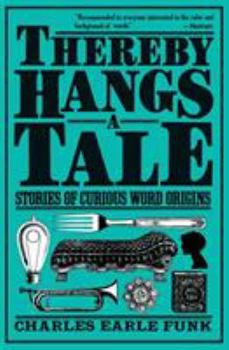Thereby Hangs a Tale
Select Format
Select Condition 
Book Overview
From "mad as a wet hen" to "corn dodger" and "hobgoblin," Charles Funk's collections of curious words and expressions are a treasure trove of word origin. In a language where hearse and rehearse have the same root and the word dunce comes from a great philosopher, English has hundreds of everyday words that originated or acquired their meanings in unusual ways. Dictionaries don't have the space to tell us all the mysteries but now Dr. Funk, with humor and insight, tells us the strange and intriguing stories of hundreds of words and how they came to be a part of our language.
Format:Paperback
Language:English
ISBN:006272049X
ISBN13:9780062720498
Release Date:January 1905
Publisher:Harper Paperbacks
Length:320 Pages
Weight:0.56 lbs.
Dimensions:0.8" x 5.3" x 8.0"
Customer Reviews
4 ratings
This Author is WELL informed, but slightly outdated
Published by Thriftbooks.com User , 15 years ago
This is another of the books I use as reference for my Trivia games on a virtual world with a very international flavor. I don't think I have the whole series yet, but I'll certainly be getting more! This author is really into what he does, and obviously loves his work. It's amusing to simply read, very informative, and gives English "transliterations" of foriegn words that none of my Trivia players have argued with. Some of the words have developed entirely different meanings since the book was written, so be sure to check a good dictionary if you AREN'T just reading it for fun. It *is* very amusing to simply read it... At least if one enjoys this kind of thing.
Delightful browsing
Published by Thriftbooks.com User , 17 years ago
This is NOT an etymological reference work (for which I recommend Ayto), but rather a mentally stimulating 300 pages for browsing. Don't expect to find a particular word and don't try to read it all at once. Instead, keep it by the bedside or in the car and read a page or two when you have a spare minute. It's a bit dated, and some entries are obscure or unfamiliar, but Harry Potter fans will delight to find such words as basilisk and mandrake. There are many such non-academic books on the stories of word origins, but this one among many has somehow captured my preference. The balance of etymology and history provides many delightful little ah-hah! moments of new insights and connections. This is best illustrated by example: I just now randomly opened the book to page 58, where we learn that the bird 'canary' is indeed from the Canary Islands, which are so named in Pliny the Elder's account of the journey, in 40 B.C., of Juba, the Mauritanian chief, through the Pillars of Hercules (Gibraltar Strait) to an island overrun with dogs which he named Canaria, Latin for 'Island of Dogs' (canine). In the next 3 pages one learns (in much greater detail): The Latin 'cancelli', for lattice, gave us the word 'cancel' from the appearance of hash marks in the days before erasers (whose usage gave us the noun 'rubber'). Roman candidates for public office wore white as a sign of purity (like brides today), so 'candidatus' (clothed in white) gave us candidate, candor, and candid. When Christopher Columbus landed in Cuba, the people explained they were Canibales, a dialectal pronunciation of Caribes, from which we get cannibal and Caribbean. 'Canopy' comes from the Greek konops, mosquito, for the purpose of the net it held. One 'canters' on a horse when riding leisurely toward CANTERbury Cathedral for a picnic at the grave of Thomas a Becket, who was murdered in 1170 by his pal, King Henry II. 'Canvas' comes from the Latin for hemp, cannabis. 'Caper' and 'caprice' describe the antics of goats, the Latin for which is 'capra' (Capricorn). Elsewhere he explains how the leap of a goat, cabriolet in Latin, gave us 'cab', with taxi (like tax) indicating the necessity of paying a toll. That's a summary of just three pages. A different sort of example from page 203 describes the amphibian once called an efeta and still today called an 'eft' in some regions. By tonal similarity, this became eveta. Since v and u were written the same, it became eueta. Just as 'due' sounds like 'dew', it became ewta, then ewte. Finally, the 'n' migrated, so that 'an ewte' became 'a newt'. If you've read this far and enjoyed it, you'll like this book. Otherwise, forget it. It's uncanny how often these factoids subsequently turn up in conversation or on Jeopardy the very same week you read it.
You can learn something while reading for fun
Published by Thriftbooks.com User , 19 years ago
I have always loved to explore word origins, which is why I love this book. While many of the origins are what you would expect, there are a few gems whose origin is most unusual. The word origins also show what a mongrel the English language is, with words developed using input from every corner of Europe, the Islamic areas of North Africa and Asia and even as far away as British India. It was fascinating to learn how so many of our words had a different form in one language and was altered two or three times before reaching the final form that we know today. I strongly recommend this to anyone interested in word origins or who just wants to learn something while doing some recreational reading.
Lots of fun and entertating
Published by Thriftbooks.com User , 23 years ago
I reviewed this book a few years ago but now that I have lived with it I think it is interesting and fun to read. The origin of many idioms and phrases is entertaining.






